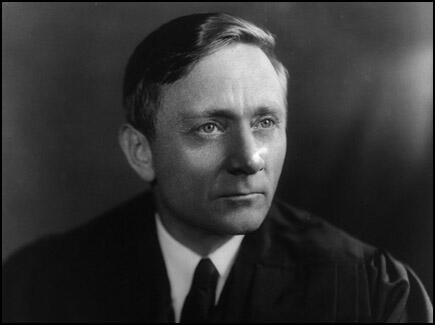William Douglas
William Douglas, the son of a Presbyterian minister, was born in Maine, Minnesota, on 6th October, 1898. The family moved to California but his father died soon afterwards. Douglas contracted polio as a child but escaped long-term paralysis.
After graduating from Whitman College he studied at Columbia University Law School where he edited the law review. In 1925 he joined a Wall Street law firm before teach law at Harvard University.
Franklin D. Roosevelt the Democratic Party candidate, was elected as president in 1932. Douglas was a supporter of Roosevelt's New Deal and in 1934 he joined the Securities and Exchange Commission. Three years later he became chairman of the commission. When Louis Brandeis retired from the Supreme Court in February, 1939, Franklin D. Roosevelt appointed Douglas to take his place. At 40 years of age he was the second youngest Supreme Court justice in United States history.
After the Second World War Black was clearly associated with the group of liberals on the Supreme Court that included Hugo Black (1937-71), Felix Frankfurter (1939-1962), Frank Murphy (1940-1949) and Thurgood Marshall (1967-1991). As a justice he strongly supported African American civil rights and freedom of speech.

William Douglas, whose books included We the Judges (1956), A Living Bill of Rights (1961) and A Wilderness Bill of Rights (1965), who retired from the Supreme Court in 1975, died in Washington, on 19th January, 1980.
Primary Sources
(1) William Douglas, ruling against the United States Steel Corporation in 1948.
We have here the problem of bigness. Its lesson should by now have been burned into our memory by Brandeis. The Curse of Bigness shows how size can become a menace - both industrial and social. It can be an industrial menace because it creates gross inequalities against existing or putative competitors. It can be a social menace - because of its control of prices. Control of prices in the steel industry is powerful leverage on our economy. For the price of steel determines the price of hundreds of other articles. Our price level determines in large measure whether we have prosperity or depression - an economy of abundance or scarcity. Size in steel should therefore be jealously watched. In final analysis, size in steel is the measure of the power of a handful of men over our economy. That power can be utilized with lightning speed. It can be benign or it can be dangerous. The philosophy of the Sherman Act is that it should not exist. For all power tends to develop into a government in itself. Power that controls the economy should be in the hands of elected representatives of the people, not in the hands of an industrial oligarchy. Industrial power should be decentralized. It should be scattered into many hands so that the fortunes of the people will not be dependent on the whim or caprice, the political prejudices, the emotional stability of a few self-appointed men. The fact that they are not vicious men but respectable and social minded is irrelevant. That is the philosophy and the command of the Sherman Act. It is founded on a theory of hostility to the concentration in private hands of power so great that only a government of the people should have it.

